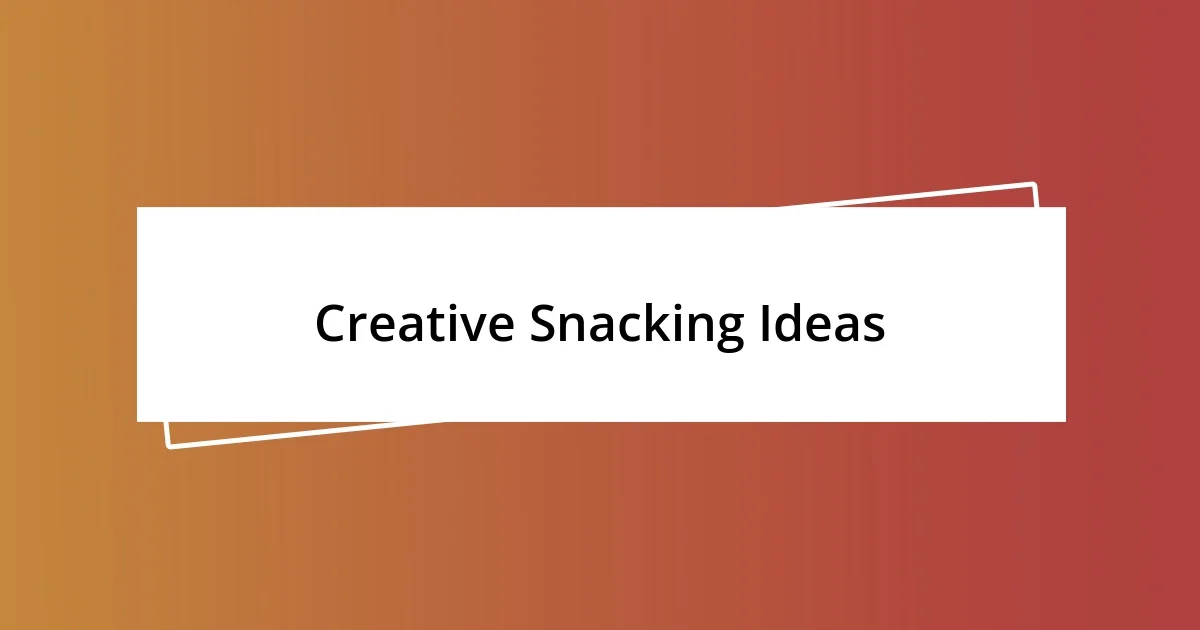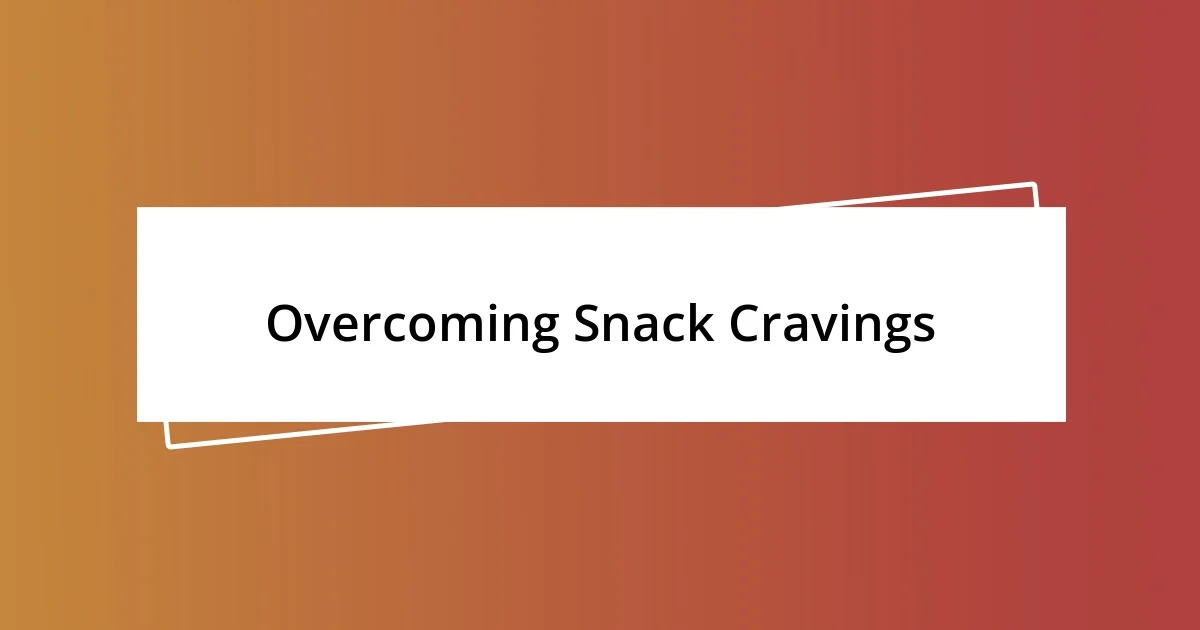Key takeaways:
- Healthy snacking involves choosing nutrient-dense foods and listening to your body’s cravings for a more balanced relationship with food.
- Planning snacks ahead of time and incorporating portion control techniques can help avoid unhealthy choices and enhance enjoyment of nutritious options.
- Tracking progress and reflecting on energy levels after different snacks can provide insights into personal health and motivate continued healthy snacking habits.

Understanding Healthy Snacking
Understanding healthy snacking starts with recognizing that not all snacks are created equal. I remember when I used to grab whatever was convenient—usually sugary treats or salty chips. Now, I think about nutrients; appreciating how a handful of nuts can keep my energy sustained longer than a candy bar ever could.
Have you ever wondered how you feel after consuming certain snacks? I’ve noticed that when I choose fruits or yogurt instead of processed snacks, I feel lighter and more energized. It’s like fueling a car with premium gas instead of the cheapest option. This simple switch changed my snacking habits and, quite frankly, my mood.
Healthy snacking is about balance and intuition. For me, it’s essential to listen to what my body craves. Sometimes, it’s a crunchy apple, and other times it’s a creamy avocado dip. Understanding these impulses has transformed my relationship with food, making snacking a joyful experience rather than a guilty pleasure. What might your body be telling you right now?

Identifying Nutrient-Dense Foods
Identifying nutrient-dense foods can truly reshape how we approach snacking. I remember the first time I swapped out my usual afternoon cookies for a vibrant bowl of mixed berries. The immediate burst of flavor from those fresh fruits was a revelation. While cookies left me feeling heavy, those berries not only satisfied my sweet tooth but also gave me energy to power through my afternoon.
To help you identify nutrient-dense foods, here are some key characteristics to look for:
- High in vitamins and minerals: Foods like spinach and sweet potatoes are packed with essential nutrients.
- Rich in fiber: Foods such as legumes and whole grains keep you full longer and support digestion.
- Healthy fats: Avocados, nuts, and seeds provide beneficial fats that are crucial for brain health.
- Low in added sugars and unhealthy fats: Aim for options that contain minimal processing, like plain Greek yogurt or fresh fruit.
- Whole foods: The more natural and unprocessed, the better. Think about colorful vegetables and lean proteins as your go-to choices.
Making these small adjustments has not only broadened my palate but also enriched my overall well-being. It’s rewarding to feel the difference in my body when I make these healthier choices.

Planning Your Snack Guide
Planning your snacks requires a bit of foresight and intention. From my experience, crafting a snack guide can help avoid those moments of reaching for something quick but unhealthy. For instance, when I dedicated some time each week to plan my snacks, I noticed I felt more satisfied and less tempted by less nutritious options. The key is to create a list of snacks that not only appeal to you but also nourish your body.
One practical step I found helpful is prepping snacks in advance. I often take an hour on weekends to slice fruits, portion out nuts, or make mini veggie bowls. Trust me, it’s a game-changer! When those pre-portioned snacks are readily available, I save time during busy weekdays, and I feel good knowing I’m making healthier choices. Have you ever tried prepping snacks? I’ve found that having easily accessible options really helps curb cravings and supports a balanced diet.
As you embark on creating your snack guide, consider a balance of flavors and textures. Mixing crunchy with creamy or salty with sweet can satisfy your palate and keep things interesting. Personally, I love pairing apple slices with almond butter. This duo not only offers a delightful crunch but also gives me protein and healthy fats that keep me content until my next meal. It’s a reminder that healthy choices can be as tasty as they are nutritious!
| Snack Type | Example |
|---|---|
| Nutrient-Dense | Greek yogurt with honey and berries |
| Prepped Ahead | Veggie sticks with hummus |
| Flavor Combo | Apple slices with almond butter |

Smart Portion Control Techniques
Portion control has become one of my greatest allies in my journey to healthier snacking. I remember a time when I mindlessly munched on handfuls of trail mix, only to realize I had consumed way more than I intended. Now, I’ve started using smaller containers, and it’s almost like a little game! By measuring out my snacks ahead of time, I not only avoid overindulging but also take a moment to appreciate the flavors I’m enjoying. Isn’t it amazing how a simple change in how we serve our food can make such a big difference?
Another technique that resonates deeply is the use of visual cues. I often fill a small bowl or plate instead of grabbing the entire bag of chips. It’s funny to think how the presentation of my snacks impacts my mindset; seeing just the right amount gives me the satisfaction of indulging without the guilt. Have you ever noticed how much more enjoyable a meal can be when it’s artfully arranged? This simple shift has helped me really savor my snacks, and I find that I taste them more instead of rushing through as if it’s a race.
I also love incorporating the “one bite rule.” With this approach, I allow myself to take one bite of a treat that might be less nutritious. If the flavor truly satisfies me, I can enjoy it guilt-free. But if it doesn’t hit the spot, I save my calories for something I genuinely crave. It’s liberating to realize that I can indulge without losing sight of my health goals. It’s like I’ve found a balance where enjoyment and health coexist—doesn’t that seem like the best of both worlds?

Creative Snacking Ideas
One snack idea that has transformed my approach is the “snack jar” concept. I fill mason jars with layers of yogurt, granola, and vibrant fruits, creating a visually appealing treat that I can grab on the go. The excitement of opening that jar and seeing the colorful layers always makes my day a little brighter. Have you ever noticed how presentation affects your appetite? For me, it’s like instantly elevating my snacking experience while ensuring I’m enjoying something nutritious.
I’ve also experimented with sweet potato toast, which has become a personal favorite. Simply slice sweet potatoes, pop them in the toaster, and top them with avocado or almond butter for a satisfying crunch. This playful twist on traditional toast keeps things interesting and still healthy. I remember the first time I tried it; the creamy avocado pairs perfectly with the hint of sweetness from the potato. It’s amazing how a simple swap can turn a basic snack into something extraordinary.
Another creative idea is spicing up popcorn. I love air-popped popcorn, but I’ll toss it with nutritional yeast, paprika, or even a sprinkle of cinnamon for a flavor explosion. It’s like discovering new dimensions in a familiar snack! Each bite fills me with a delightful crunch and a savory or sweet twist that never fails to satisfy my cravings while keeping things light. Have you tried flavoring popcorn this way? I find it’s an easy way to enjoy a treat that feels indulgent but is genuinely wholesome.

Overcoming Snack Cravings
When tackling snack cravings, I’ve discovered that keeping a journal has been incredibly beneficial. I jot down what I crave and why I think I’m reaching for a snack. This reflection not only helps me understand my emotional triggers but also makes me more mindful. Have you ever noticed how stress can lead to reaching for those extra snacks? I remember a particularly hectic week when I turned to cookies for comfort. By writing it down, I realized I was just distracting myself rather than addressing my stress head-on.
Another strategy I’ve employed is the “substitution game.” When I have a sudden urge for something sugary, I try to replace it with a healthier option. For instance, if I’m craving chocolate, I might reach for a piece of dark chocolate or even a banana with a sprinkle of cocoa powder. I find that satisfying my cravings with these alternatives keeps me on track while still enjoying something delicious. Isn’t it fascinating how a small change can keep your taste buds happy without derailing your goals?
I also like to prepare a go-to “snack kit” for those moments when cravings hit hard. I keep it stocked with things like sliced veggies, hummus, and nuts. I recall once being stuck in traffic and feeling that familiar urge to munch on junk—only to remember I had my snack kit in the back seat. I popped open a container of crunchy carrots with some creamy hummus, and suddenly, that craving was long gone. It’s incredible how having healthy snacks readily available can turn potential pitfalls into moments of triumph!

Tracking Your Progress Effectively
Tracking your progress is a vital aspect of my journey to healthier snacking. I’ve found that using a simple app to record what I eat helps me visualize my choices. There was a time when I thought keeping track was tedious, but once I started, it became a rewarding experience to see my snack decisions align with my health goals.
As I reflect on my progress, I also take notes on my energy levels and mood after different snacks. For example, I noticed that after switching from chips to a handful of nuts, my energy surged rather than dipped. Have you ever wondered how your body really responds to what you eat? Tracking these patterns gave me insights that just counting calories couldn’t provide.
I often set short-term goals, like aiming for five servings of fruits and veggies in my daily snacks. Whenever I achieve that, I reward myself—I might treat myself to a fresh smoothie or a fun new recipe. This method of rewarding small victories helps keep me motivated. What about you? How do you celebrate your wins along the way? Sharing your progress, no matter how small, can turn your journey into a more engaging and supportive experience.














